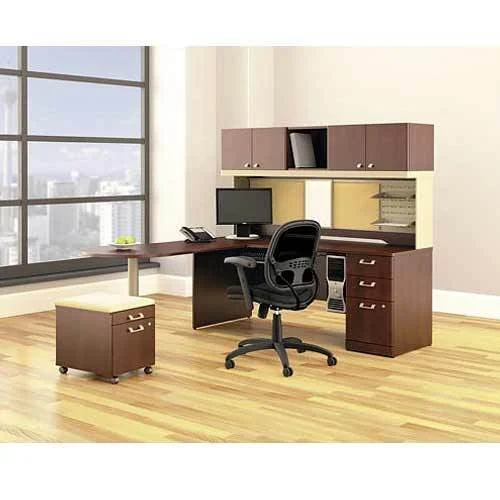In the modern business world, productivity, comfort, and design go hand in hand. An organized, well-furnished office isn’t just about aesthetics—it’s a reflection of your company’s culture, values, and efficiency. Whether you’re setting up a new workspace or upgrading an existing one, the right office furniture and accessories can dramatically impact employee performance, creativity, and overall satisfaction.
From ergonomic chairs to smart desks, from cable organizers to monitor stands, office furniture and accessories form the backbone of a professional and efficient environment. This blog explores their importance, types, and the key considerations when choosing the right pieces for your workspace.
The Importance of Office Furniture and Accessories
The office is where ideas are born, deals are made, and teamwork thrives. But without proper furniture and accessories, even the most talented teams can feel stifled. Here’s why they matter:
1. Boosts Productivity and Focus
Ergonomically designed furniture helps employees maintain proper posture, reduces fatigue, and minimizes discomfort. Comfortable seating, adjustable desks, and organized workstations allow people to focus on tasks longer without distraction.
2. Creates a Professional Image
Your office design sends a message. Sleek desks, matching furniture, and coordinated accessories give clients and employees a sense of professionalism and organization. First impressions often start with what people see when they walk into your workspace.
3. Promotes Employee Well-Being
Office ergonomics directly affect health. Poor posture and inadequate furniture can lead to neck pain, back strain, and long-term issues. Quality furniture not only enhances comfort but also contributes to physical and mental well-being.
4. Improves Organization and Efficiency
Accessories like filing cabinets, cable trays, and drawer organizers reduce clutter. A tidy desk boosts clarity of thought and helps employees manage their time and resources better.
5. Enhances Collaboration and Creativity
Flexible office furniture arrangements can encourage collaboration. Modular tables, breakout area sofas, and whiteboard walls invite spontaneous brainstorming and teamwork.
Types of Office Furniture
Office furniture has evolved beyond the traditional desk-and-chair setup. Today’s workspaces are dynamic, multifunctional, and designed with both aesthetics and ergonomics in mind.
1. Office Desks
Desks are the centerpiece of any workspace. Depending on the layout and purpose, businesses can choose from:
-
Executive Desks: Larger, stylish designs for leadership spaces.
-
Standing Desks: Adjustable height desks that promote movement and posture change throughout the day.
-
L-Shaped and U-Shaped Desks: Ideal for multitaskers who need more surface area.
-
Collaborative Desks: Long tables or modular setups that foster teamwork and communication.
2. Office Chairs
An ergonomic chair is a must-have for comfort and health. Features like adjustable armrests, lumbar support, swivel bases, and breathable materials make a huge difference.
Popular chair types include:
-
Task Chairs: Compact and flexible for daily use.
-
Executive Chairs: Premium leather or mesh chairs designed for comfort and authority.
-
Ergonomic Chairs: Scientifically engineered to support posture and spine health.
-
Conference Chairs: Designed for boardrooms and meeting spaces with sleek profiles and comfort in mind.
3. Storage Solutions
An organized office is a productive one. Storage options include:
-
Filing Cabinets: For documents, contracts, and records.
-
Pedestals: Compact drawer units that fit under desks.
-
Bookcases and Shelving Units: Great for displaying materials, awards, or decor.
-
Lockers: For employee personal storage in modern, open workspaces.
4. Meeting and Conference Furniture
Conference rooms demand furniture that combines function with aesthetics. Large tables with integrated cable management, comfortable seating, and audio-visual stands are essential for professional meetings and client presentations.
5. Reception and Lounge Furniture
Your reception area sets the tone for visitors. Stylish sofas, coffee tables, and display units create a welcoming and professional atmosphere.
6. Breakout and Collaboration Areas
Modern offices emphasize relaxation and informal collaboration. Modular sofas, bean bags, and café-style seating allow employees to recharge and exchange ideas freely.
Must-Have Office Accessories
While furniture forms the foundation, accessories complete the workspace. The right accessories can transform a simple desk into a productive workstation.
1. Monitor Stands and Mounts
Monitor stands improve ergonomics by raising screens to eye level, preventing neck strain. Dual or triple monitor mounts help maximize desk space and workflow efficiency.
2. Desk Organizers
Keep essentials like pens, notepads, and gadgets within reach while maintaining a clutter-free workspace. Drawer organizers and cable trays are great for tidiness.
3. Lighting Solutions
Proper lighting enhances productivity and reduces eye strain. Desk lamps with adjustable brightness or color temperature help create the perfect work atmosphere.
4. Keyboard Trays and Mouse Pads
These accessories improve wrist posture and prevent repetitive strain injuries. Ergonomic mouse pads with wrist support are especially beneficial for long work hours.
5. Whiteboards and Pinboards
For brainstorming sessions, planning, and reminders, whiteboards and pinboards are essential. They encourage creativity and visual thinking.
6. Power and Charging Solutions
Cable organizers, USB hubs, and wireless chargers keep devices powered up and desks neat.
7. Acoustic Panels and Privacy Screens
Open offices often struggle with noise. Acoustic panels and desk dividers create private, focused zones without isolating team members completely.
Trends in Modern Office Furniture and Accessories
The workplace is changing, and so are design priorities. Here are some trends shaping the future of office furniture and accessories:
1. Ergonomics First
Post-pandemic, health and comfort are top priorities. Sit-stand desks, adjustable monitors, and ergonomic chairs have become standard in modern offices.
2. Sustainability
Eco-friendly furniture made from recycled materials and sustainable wood is in high demand. Companies are aligning their workspaces with their environmental values.
3. Smart Office Solutions
IoT-enabled furniture, like height-adjustable desks with memory settings or sensors that monitor posture, is becoming more common in tech-driven offices.
4. Minimalist and Modular Designs
Clean lines, flexible layouts, and space-saving designs are favored in today’s offices. Modular systems allow for easy reconfiguration as teams grow or priorities shift.
5. Hybrid Work Adaptation
As hybrid work models grow, compact home-office setups and portable accessories are gaining popularity. Employees need furniture that’s functional both in office and remote environments.
Choosing the Right Office Furniture and Accessories
When selecting office furniture, consider these key factors:
-
Ergonomics: Prioritize comfort and posture support.
-
Space Planning: Choose furniture that fits your layout and workflow.
-
Aesthetics: Reflect your brand identity and culture through color, material, and design.
-
Durability: Invest in long-lasting materials like steel, hardwood, and high-quality mesh.
-
Functionality: Look for multi-purpose furniture that adapts to different tasks.
A thoughtful mix of comfort, practicality, and style can transform your workspace from ordinary to inspiring.
Why Tecisoft Is a Trusted Source for Office Furniture and Accessories
When it comes to outfitting your workspace with durable, ergonomic, and stylish furniture, Tecisoft stands out as a trusted provider. Offering a wide range of office furniture and accessories, Tecisoft caters to diverse needs — from startups setting up compact workstations to large enterprises designing collaborative spaces. With an emphasis on quality, value, and customer satisfaction, Tecisoft helps businesses create work environments that foster productivity and comfort.
Whether you’re looking for executive desks, ergonomic chairs, or efficient storage solutions, choosing a reliable supplier ensures you invest in furniture that not only enhances performance but also reflects professionalism.
Final Thoughts
Office furniture and accessories are more than just items on a shopping list — they’re the foundation of workplace success. The right setup promotes efficiency, comfort, and creativity, while poor choices can lead to clutter, discomfort, and decreased morale.
As workplaces continue to evolve, focusing on ergonomics, flexibility, and design is key to staying ahead. With modern solutions now catering to every need and budget, building a productive, inspiring, and comfortable workspace has never been easier.



